Strategies for Financial Planning and Wealth Management in the UAE
The United Arab Emirates (UAE) is known for its affluent lifestyle and luxurious amenities. With a thriving economy and high standard of living, it is no surprise that the country attracts a large number of expats looking to build their wealth. However, managing and preserving wealth can be challenging, and it requires careful planning and a solid financial strategy.
Financial planning and wealth management are essential components of achieving financial security and success. Financial planning involves assessing an individual’s financial situation and developing a plan to achieve their financial goals. Wealth management, on the other hand, focuses on the management and preservation of wealth over the long term.
The UAE has a well-developed financial services industry, with numerous local and international banks, investment firms, and financial advisors offering a wide range of services to individuals and businesses. These services include financial planning, wealth management, investment management, estate planning, and tax planning, among others.
One of the key aspects of financial planning in the UAE is retirement planning. The country has a mandatory pension scheme for expats known as the End of Service Gratuity (ESG). Under this scheme, an expat who completes a minimum of one year of service is entitled to receive a gratuity payment equivalent to 21 days of basic salary for each year of service, up to a maximum of two years’ salary. However, this payment is not sufficient to cover an individual’s retirement needs, and it is crucial to have a retirement plan in place.
Wealth management in the UAE is also becoming increasingly important, given the country’s growing number of high-net-worth individuals (HNWIs). HNWIs are defined as individuals with a net worth of at least $1 million, excluding their primary residence. According to a report by Credit Suisse, the number of HNWIs in the UAE increased by 6.2% in 2020, despite the COVID-19 pandemic.
HNWIs require sophisticated wealth management services that can help them grow and preserve their wealth. These services include investment management, asset allocation, risk management, and tax planning. Investment management is particularly important, given the volatile nature of the financial markets. A skilled wealth manager can help an individual create a diversified investment portfolio that is tailored to their risk tolerance, financial goals, and investment time horizon.
Asset allocation is also crucial in wealth management. This involves spreading an individual’s investments across different asset classes, such as equities, bonds, real estate, and commodities, to reduce risk and maximize returns. Risk management is another important aspect of wealth management, as it helps individuals protect their wealth from potential risks such as market volatility, inflation, and geopolitical events.
Tax planning is also an essential component of wealth management in the UAE, given the country’s tax-free environment. However, expats still need to be aware of their tax obligations in their home countries and ensure that they comply with local tax laws. A skilled wealth manager can help individuals navigate the complex tax landscape and minimize their tax liabilities.
In conclusion, financial planning and wealth management are crucial components of achieving financial security and success in the UAE. The country’s well-developed financial services industry offers a wide range of services to individuals and businesses, including retirement planning, investment management, asset allocation, risk management, estate planning, and tax planning. Given the country’s growing number of HNWIs, sophisticated wealth management services are becoming increasingly important. By working with a skilled financial advisor, individuals can develop a solid financial strategy that is tailored to their unique needs and financial goals, and help them achieve long-term financial success.





